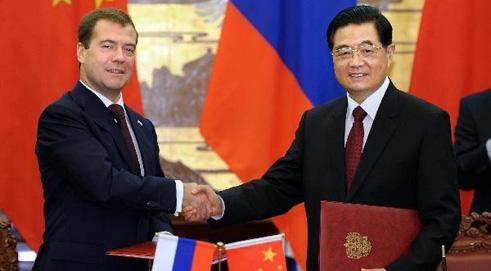
Chinese President Hu Jintao (R) shakes hands with Russian President Dmitry Medvedev as they sign a joint statement to comprehensively deepen the strategic partnership of coordination of China and Russia in Beijing, Sept. 27, 2010. (Xinhua/Li Tao)
BEIJING, Sept. 27 (Xinhua) -- Russian President Dmitry Medvedev Monday signed a series of political and commercial deals on his second state visit to China, a sign of closer strategic ties between the two world powers.
Medvedev held talks with his Chinese counterpart Hu Jintao Monday in Beijing. They celebrated the completion of a long-awaited China-Russia oil pipeline, the largest bilateral project between the two countries.
The 999-km pipeline runs from Angarsk in Russia to Daqing in northeast China. It is part of a bilateral loan-for-oil deal that was reached in 2009. Under it, China makes a 25-billion-U.S.-dollar long-term loan to Russia while Russia supplies China with 300 million tonnes of oil through pipelines from 2011 until 2030.
"The smooth completion of the pipeline project is a model for the two countries' mutually beneficial win-win cooperation and a milestone for China-Russia energy cooperation," said Hu at the completion ceremony.
The two countries also signed 15 deals on cooperation covering coal, gas supply, energy efficiency, renewable energy, nuclear power, power grids and banking.
Medvedev arrived in northeast China's port city of Dalian Sunday to start his state visit. There, he met with veteran Chinese and Russian soldiers who participated in China's War of Resistance against Japanese Aggression (1937-1945), part of WWII, underscoring the "deep bonds" between the Russian and Chinese peoples.
The Medvedev-Hu meeting in Beijing was their fifth meeting this year, a rare frequency of meeting for two heads of state. Medvedev also met with top legislator Wu Bangguo and Premier Wen Jiabao on Monday.
Hu and Medvedev also signed a joint statement to comprehensively deepen their strategic partnership of coordination, a description of bilateral ties decided upon in 1996.
"The highly frequent contact between the two heads of state complies with the interests of the two peoples and will help boost bilateral ties. The weighty agreements just showcase the closer cooperation," said Medvedev in talks with Hu.
Hu told reporters after their talks the China-Russia strategic partnership of coordination "stands at a new starting point" as he called for a "new era" of bilateral ties.
While the energy deals are the spotlight of the world's attention during Medvedev's China visit, analysts said the deals are just one part of bilateral trade ties.
"Even though energy cooperation is an important part of China-Russia trade, it is, of course, not enough to constitute all of the two nations' trade," said Jiang Yi, a Russia expert with Chinese Academy of Social Sciences, adding that the two countries enjoy cooperation potential in areas like investment, high-tech, agriculture and finance.
In the talks, President Hu highlighted cross-border cooperation and cooperation in high-tech and innovation.
Hu also expressed his support for Russia's proposal on inter-bank listed trading of the RMB and Ruble in the forex markets.
"The two sides agreed that enhancing pragmatic cooperation in various fields between the two countries is of great significance to the quickened modernization of both countries," said Hu.
Medvedev, accompanied by a large delegation of senior officials and business tycoons, hailed bilateral trade cooperation and expressed hope the two countries can put their focus on major cooperative projects.
"We are delighted to see that bilateral trade has almost recovered from the impact of the global financial crisis, with trade volumes expected to bounce back to pre-crisis levels by the end of the year," Medvedev said.
Sino-Russia trade rose 49.6 percent year on year in the first seven months of this year to 30.7 billion U.S. dollars, according to official statistics. Analysts expect bilateral trade to reach 60 billion U.S. dollars this year.
Apart from bilateral ties, China and Russia are seeking close coordination in the international arena.
Hu and Medvedev both hailed the closer coordination of Russia and China under the frameworks of the G20, the Shanghai Cooperation Organization (SCO) and as BRIC countries (China, India, Russia and Brazil).
"The coordination between Russia and China on the international stage is strategic cooperation. This guideline, which allows us to adapt to the complex international situation, will not falter," said the Russian president.
In the meantime, Hu urged the two sides to deepen the mechanism of strategic security negotiations while supporting each other on issues concerning their respective core interests.
"China and Russia will maintain international peace and stability and promote the overall recovery, and healthy and stable development of the world economy," Hu said.
Medvedev's three-day visit will also take him to Shanghai, where he will attend Russia's National Pavilion Day at the ongoing World Expo on Tuesday.
"Your visit comes as the world political and economic landscape undergoes profound changes," said Premier Wen in a meeting with Medvedev while emphasizing the all-round outline of future China-Russia cooperation.
"As the major issues between the two countries have been resolved, the two governments should implement the consensuses reached by the two heads of state and lift bilateral ties to a new level," Wen said.
Source: Xinhua
Related News
Photos
More>>trade
- Chinese VP Encourages Younger Officials to Work at Grass-roots Level
- Senior CPC Official Attends Evening Gala Marking 65th Birthday of DPRK's Ruling
- Culture Year Marks 40 years of Sino-Italian Ties
- China Vows to Work with DPRK's New Leadership to Boost Ties
- Chinese, Italian Leaders Agree to Expand All-round Cooperation
market
- Chinese Premier Arrives in Turkey for Official Visit
- China, Turkey Issue Joint Declaration on Establishing Strategic Relationship of
- Chinese Premier Meets with German Chancellor
- Chinese Premier Meets Euro Group Leaders on Exchange Rate
- Senior Chinese Official Calls for Rule of Law in Decision Making





